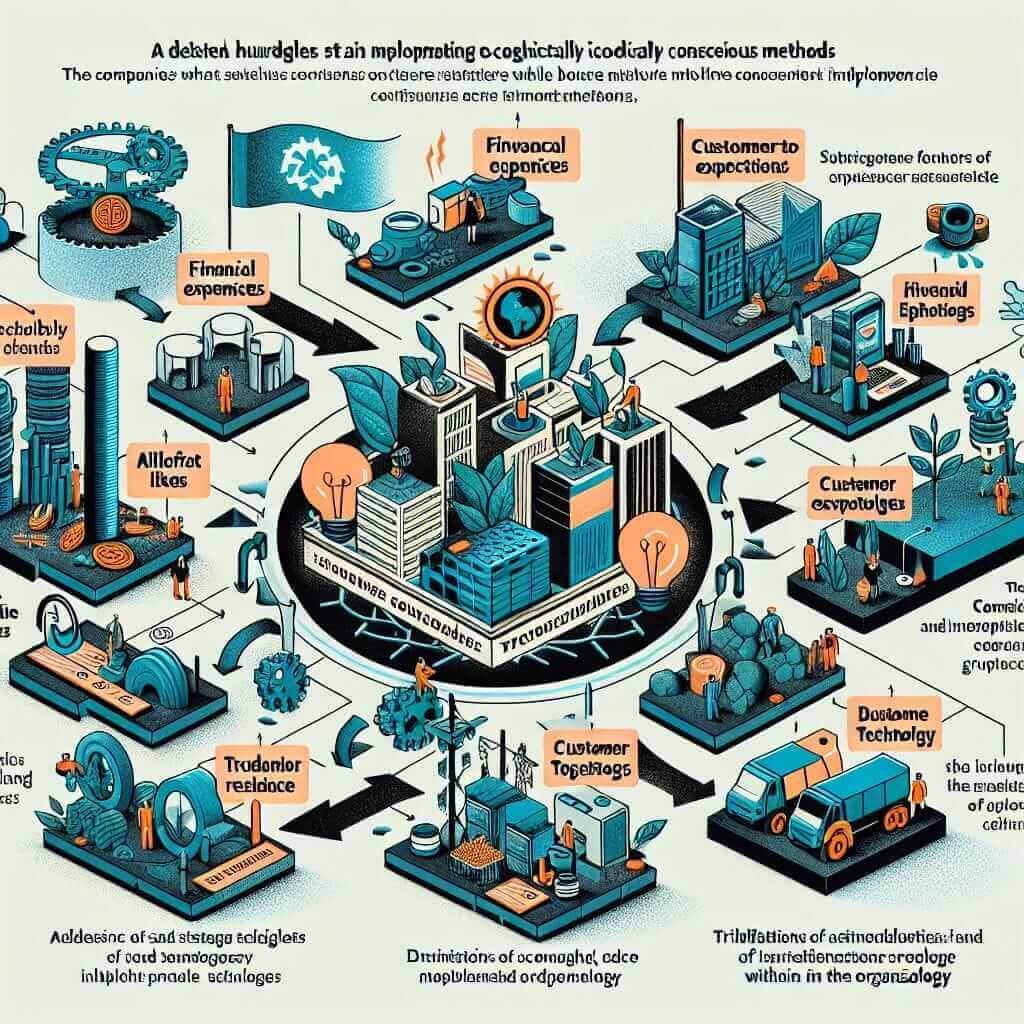The IELTS Reading section assesses your ability to understand and process written English in various contexts. Topics often include current trends and relevant issues, making the theme of sustainability in business a likely candidate. With increasing global focus on sustainable practices, understanding its intricacies can offer vital insights for your IELTS preparation.
Reading Passage and Questions
Passage
Sustainable Practices in Business: Challenges and Solutions
In recent years, the global movement towards sustainability has gained momentum, with businesses across the world striving to reduce their environmental footprint. However, implementing sustainable practices is fraught with challenges that can impede progress. This article delves into several obstacles businesses face when trying to become more sustainable.
One of the primary challenges is the financial cost. Initial investments in sustainable technology and practices can be substantial. For instance, upgrading machinery to more energy-efficient models often requires significant capital outlay. Many small to medium-sized enterprises (SMEs) find this particularly daunting.
Furthermore, regulatory compliance is another hurdle. Different countries have varying regulations regarding sustainability, making it difficult for multinational companies to maintain a consistent approach. Companies must navigate a complex web of laws and standards, which can lead to increased administrative workload and costs.
Another significant barrier is the lack of consumer awareness and demand. For sustainable business practices to thrive, there must be an equal push from consumers. However, many consumers remain unaware of the environmental impact of their choices, creating a challenging market for sustainable products. Companies often find themselves in a position where they must educate their customer base, which can be both time-consuming and costly.
Additionally, the technological challenges cannot be overlooked. While advancements in technology have provided various tools for sustainability, integrating these technologies into existing processes can be complex. Ian Billington, a sustainability consultant, argues that the transition phase can cause temporary dips in productivity and profitability, which dissuades many businesses from making the shift.
Lastly, cultural resistance within the organization can be a formidable challenge. Sustainable practices often require changes in behavior and mindset at all levels of a company. Employees and management may be resistant to change, especially if they do not see the immediate benefits. Overcoming this resistance requires comprehensive training and a shift in corporate culture, which takes time and effort.
Despite these challenges, there are several strategies businesses can employ to overcome these obstacles. By seeking government grants and subsidies, businesses can offset some of the financial burdens. Additionally, fostering a culture of sustainability through continuous education can help alleviate internal resistance. Understanding and navigating regulatory landscapes with the help of specialized consultants can also minimize compliance-related issues.
In conclusion, while the road to sustainability is lined with challenges, businesses that persevere stand to benefit not only financially but ethically. The commitment to sustainable practices is no longer a choice but a necessity in today’s environmentally-conscious world.

Questions
Multiple Choice
-
What is one of the primary financial challenges businesses face in adopting sustainable practices?
- A. Lack of consumer demand.
- B. High initial investments.
- C. Regulatory compliance.
- D. Technological advancements.
-
According to the passage, why is regulatory compliance a significant challenge?
- A. Regulations are the same in all countries.
- B. It reduces administrative workload.
- C. Different countries have different regulations.
- D. It makes the implementation faster.
True/False/Not Given
-
SMEs find the initial investment in sustainable technology manageable.
- True
- False
- Not Given
-
Ian Billington argues that the transition to sustainable practices does not affect productivity.
- True
- False
- Not Given
Matching Information
- Match the following challenges with their descriptions:
- A. Financial cost
- i. The complexity of integrating new systems.
- B. Technological challenges
- ii. Initial capital outlay for upgrading machinery.
- C. Cultural resistance
- iii. Internal resistance requiring comprehensive training.
- A. Financial cost
Answer Key
- B. High initial investments.
- C. Different countries have different regulations.
- False
- False
- A-ii, B-i, C-iii
Common Mistakes
- Misreading Questions: Ensure you understand what the question is asking before choosing an answer. Carefully reading the passage will help in selecting the most accurate option.
- Skimming Instead of Scanning: Skimming can provide a general idea, but scanning helps locate specific information quickly, which is vital for answering questions correctly.
- Ignoring Key Words: Pay close attention to key words in both the passage and the questions. They often hold the clue to the right answer.
Vocabulary
- Footprint (noun): /ˈfʊtˌprɪnt/ – The impact or mark left behind by something, often used to describe environmental impact.
- Substantial (adjective): /səbˈstæn.ʃəl/ – Large in size, value, or importance.
- Compliance (noun): /kəmˈplaɪəns/ – The act of adhering to or conforming with rules or standards.
- Dissuade (verb): /dɪˈsweɪd/ – To persuade someone not to take a particular action.
- Persist (verb): /pərˈsɪst/ – To continue steadfastly in an action or belief despite difficulty or opposition.
Grammar Focus
Comparatives and Superlatives
- Forming Comparatives: Add “-er” to short adjectives (e.g., “greater”) or use “more” before long adjectives (e.g., “more effective”).
- Example: “Sustainable practices are more effective in the long run.”
- Forming Superlatives: Add “-est” to short adjectives (e.g., “greatest”) or use “most” before long adjectives (e.g., “most effective”).
- Example: “Implementing green technology is often the most effective strategy for reducing environmental impact.”
Conclusion
Preparing for the IELTS Reading section requires a strategic approach to understanding and processing information. By focusing on relevant topics such as the challenges of implementing sustainable practices in business, you not only improve your reading skills but also stay informed about current global issues. Remember to practice regularly with different types of texts and questions to enhance your reading fluency and accuracy. For more insights on ethical leadership in business, visit our Ethical Leadership in Business page. Happy studying, and success in your IELTS journey!